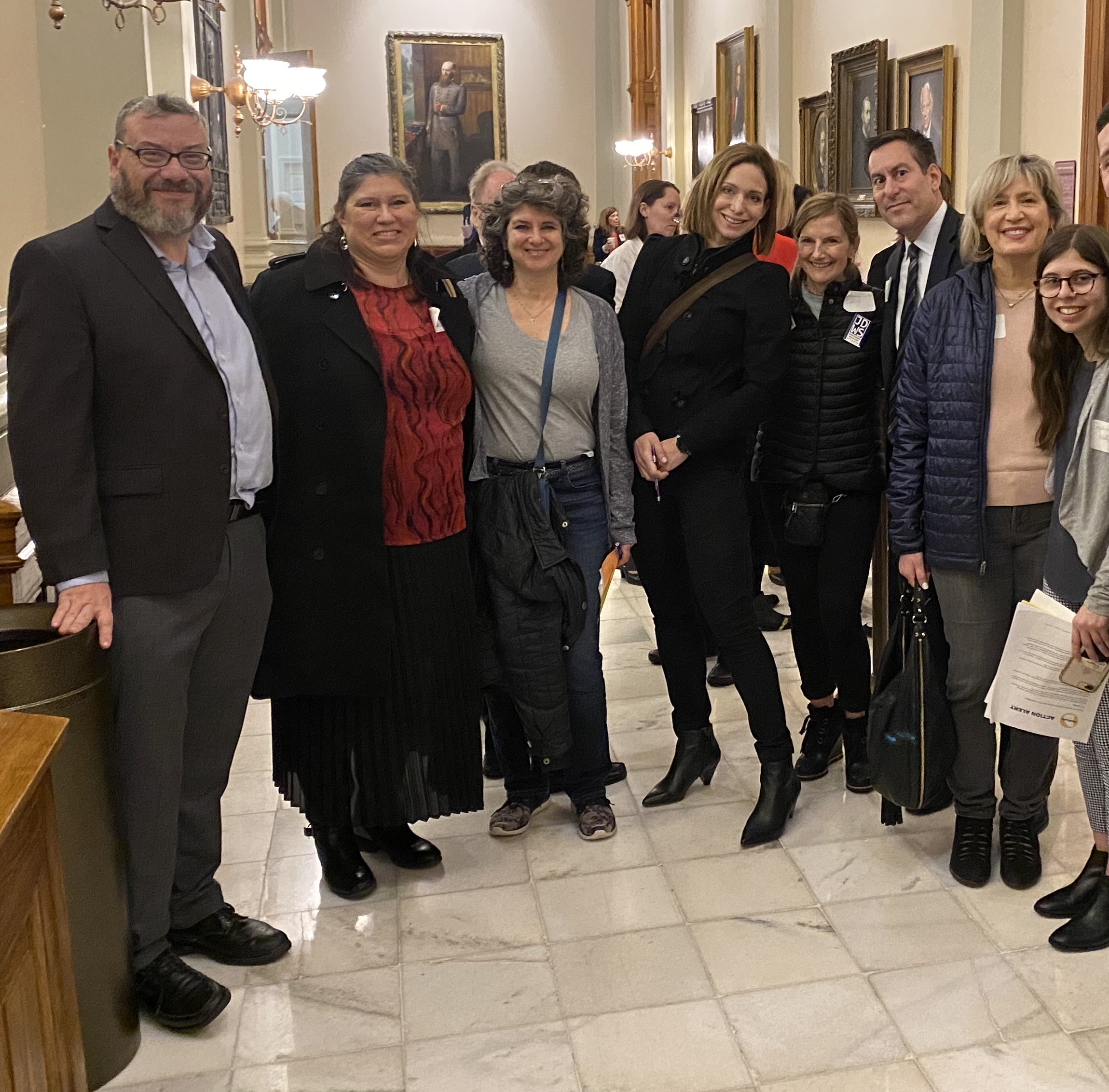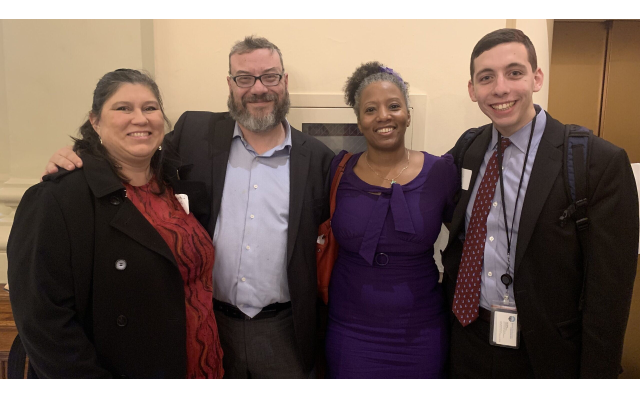Atlanta Jews Lead Interfaith Anti-Hate Lobby
A coalition of Jewish and non-Jewish organizations met in downtown Atlanta to lobby the Georgia legislature for hate crimes legislation.
A coalition of Jewish and non-Jewish organizations met in downtown Atlanta Feb. 26 to lobby the Georgia legislature for hate crimes legislation. The effort was led by Tzedek Georgia and the Jewish Community Relations Council.
Before the diverse group of Jews, Christians, Muslims, and others walked from The Catholic Shrine of the Immaculate Conception to the Georgia State Capitol to meet with key legislators and lobby their representatives, there was a breakfast, panel and brief discussion. Considering the legislation and how to lobby, Tzedek Georgia and JCRC joined forces with the Georgia Interfaith Public Policy Center, of which JCRC is a founding member; the Anti-Defamation League; several legislators, including Sens. Brandon Beach and Elana Parent, and Rep. Mike Wilensky; Jeff Graham, the executive director of Georgia Equality, a LGBTQ rights group.
“Georgia is one of five states in the nation that still does not have a hate crimes statute. Georgia citizens are not protected from most hate crimes that could and would occur,” the ADL’s Allison Padilla-Goodman told the AJT. “We have a hate crimes bill that’s been given wide bipartisan support. We have bipartisan sponsors and ADL leads a coalition called ‘Hate Free Georgia’ that has 30-plus different organizations on the coalition that represent both sides of the aisle and all affinity groups all coming together.”
The hate crimes bill, HB 426, passed the House last year and is currently sitting in the Senate Judiciary Committee. “We are excited about the prospect of this bill passing,” said Padilla-Goodman, vice president of ADL’s Southern division. “We think that once we get a hearing, we’ve got a really good chance of making Georgia the 46th state in the nation that has a hate crimes statute and protects its citizens for identity-based crimes.”
A hate crime must have two pieces, she said: a bias motivation and an underlying crime. The bill would be a penalty enhancement, saying that crimes motivated by bias are more severe. HB 426 would protect all people from bias crimes based on religion, race, color, national origin, sexual orientation, gender or disability.

JCRC has supported hate crimes legislation for years. To pass this legislation, they are in coalition with the GIPPC. “We have so many people of faith here and a lot of them are very active in social justice areas, particularly in poverty, housing, healthcare, criminal justice,” said Leslie Anderson, JCRC executive director. “We just felt that would be a good opportunity to bring people of all faiths together to show what we have in common and pull together our voices.”
Along with the hate crimes bill, the lobby day focused on lobbying against SB 368, which would allow adoption agencies to discriminate against religious and other minorities while receiving government funding.
Anderson said she was concerned about the adoption bill. “My reading of it is that it feels very overbroad to me and on its face appears to be problematic. The room for discrimination in a whole bunch of different directions seems so obvious to me.”
Tzedek Georgia co-chair Jeff Willard spoke to the crowd about the best way to lobby politicians and said they can be swayed by constituents. If enough people speak face-to-face, call and email their representatives in support or opposition of a bill, it can create pressure on the floor for politicians to vote a certain way.
Of the lobby day, Willard told the AJT, “Every single year we stop some bad bills and get some good ones passed.” The goal was to get the hate crimes bill moving to a hearing and vote, and to oppose the adoption bill, he said. Tzedek Georgia has a legislative agenda for the rest of the year that includes supporting gun safety laws, repealing campus carry, and Medicaid expansion.
“Religious adoption agencies, they can take money from the state to discriminate against really anyone they want, particularly same-sex couples but it could be Jewish couples as well. We saw in South Carolina that that happened where a Jewish couple was refused adoption by a Christian agency,” Willard said. “One of the governor’s goals is to get more children adopted out of foster care because we have a lot of children in foster care. And that’s just not the best place for them to be. They really need to be in loving homes. And so why cut off sources that are willing to take in children and give them loving homes?”
For JCRC intern Noah Roos, this was a great opportunity to learn how to lobby legislators. “I’m definitely very excited to be able to get to take some action on an important issue,” he said. A former intern on Capitol Hill, Roos has seen the other side of lawmaking, but this is the first time lobbying to pass bills. “It’s been exciting getting to know more about the bill and getting to have worked behind the scenes to help make this happen.”
Author and educator Tarece Johnson said that her identity as a black and Jewish woman made hate crimes legislation very important to her. Affiliated with Alliance for Black Lives and Black Lives Matter, Johnson said this bill would be an important protection for black lives and mentioned the number of transgender people being killed. “Those stiffer laws may deter people from wanting to even commit an act of hate,” Johnson said. This is just one initiative in the collaboration between the Jewish and black community, she said. They’re also working together on voter awareness and mobilization.
“[We can] really be in solidarity with one another around something that impacts both Jewish lives and black lives,” Johnson said of the hate crimes bill. “We’re going to continue to look at ways that we can find things that we can mutually identity with and fight together.”
Hate crimes legislation had already been on the agenda of her organizations, making this collaboration an easy one that would benefit both communities. “I’m committed to both because I live this space; I live this life. So I’m committed to doing what I can to make life better for black people, and then I’m Jewish; whatever I can to make life better for Jewish people and to end anti-Semitism and hate around the nation and the world because really, hate crimes have spiked not just in the U.S.”




comments